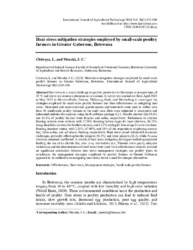Heat stress mitigation strategies employed by small-scale poultry farmers in Greater Gaborone, Botswana.
Abstract
Heat stress is a major challenge in poultry production in Botswana as temperatures of 35 oC and above are common phenomena in summer. A survey was carried out from April 2023 to May 2023 in Metsimotlhabe, Gabane, Tlokweng, Oodi, and Matebeleng to investigate the strategies employed by small-scale poultry farmers and their effectiveness in mitigating heat stress. Structured and semi-structured questionnaires and interviews were used to collect data from 48 small-scale poultry farmers in the study area. Data were subjected to descriptive and inferential statistics for analyses using the R software package 4.2.2. Results showed that 58.4% and 41.6% of poultry farmers were females and males, respectively. Preferences in chicken farming systems were evident, with 37.50% favoring battery cages for layer chickens, 56.25% using deep litter systems for broiler chickens, and 6.25% opting for free-range Tswana chickens. Feeding practices varied, with 2.10%, 47.90%, and 50% of the respondents employing once-a-day, twice-a-day, and ad libitum feeding, respectively. Heat stress posed substantial economic challenges, primarily affecting broiler projects (56.3%) and layer projects (29.2), while Tswana chickens remained unaffected. A variety of heat stress mitigating techniques including regulated feeding, the use of an electric fan, Aloe vera, electrolytes (i.e., Phoenix stress pack), adequate ventilation, and the administration of cool water were used. Cost-effectiveness analysis revealed no significant correlation between heat stress management strategies and poultry types. In conclusion, the management strategies employed by poultry farmers in Greater Gaborone appeared to be ineffective in mitigating heat stress; hence a need for cheaper alternatives.
Collections
- Research articles [172]

